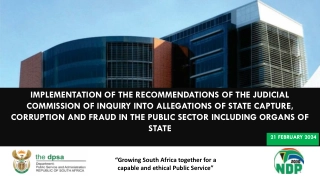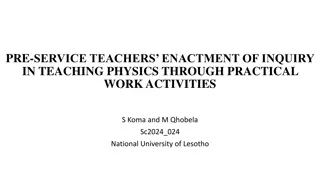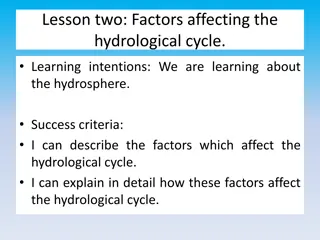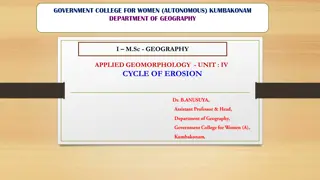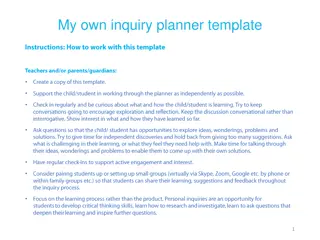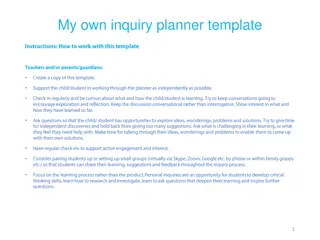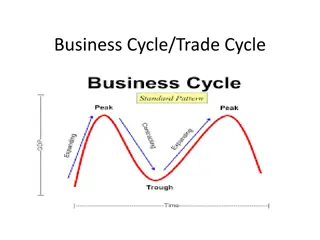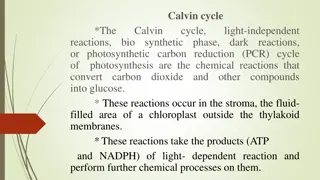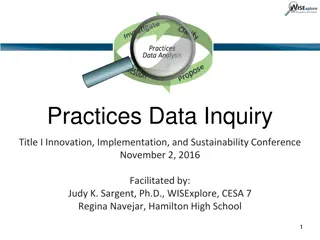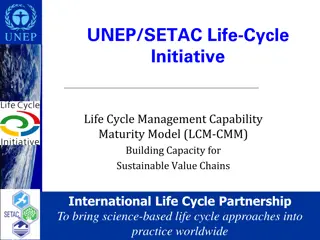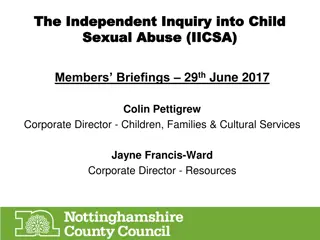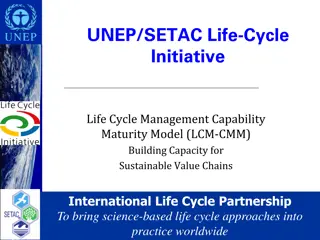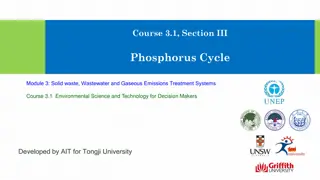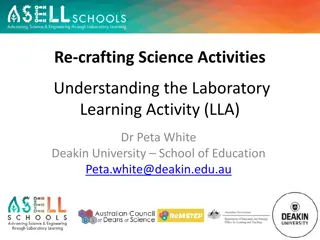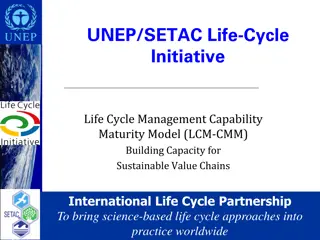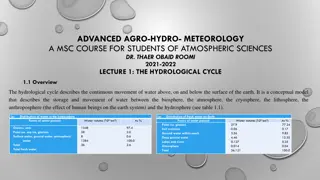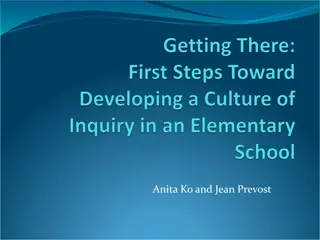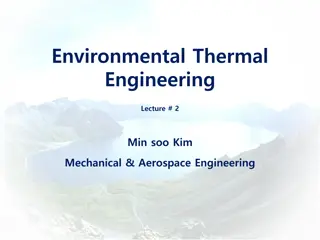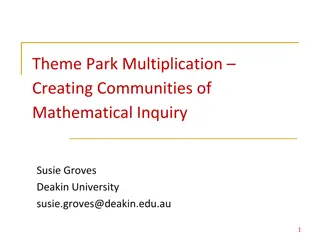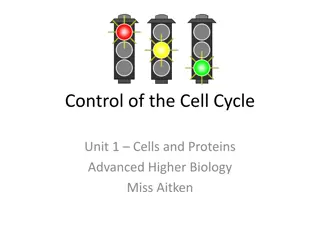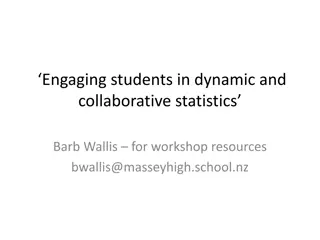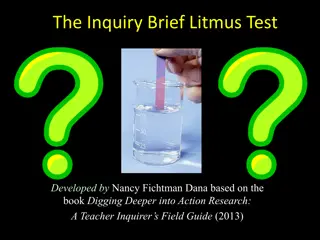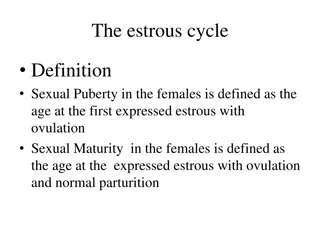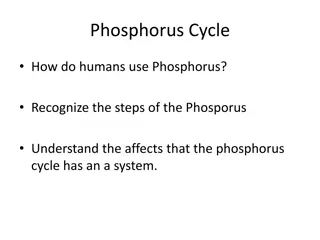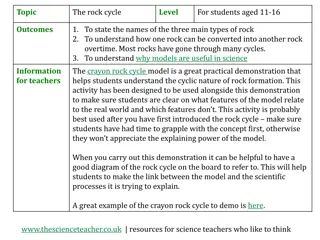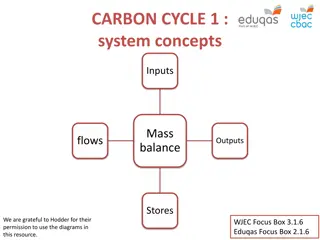Implementation of Recommendations from Judicial Commission of Inquiry for a Capable and Ethical Public Service
The Department of Public Service and Administration (DPSA) is systematically implementing recommendations from the Judicial Commission of Inquiry into State Capture, Corruption, and Fraud in the Public Sector. This includes lifestyle audits for the National Executive, review of public sector legisla
0 views • 17 slides
Understanding Pre-Service Teachers' Inquiry Teaching in Physics
Lesotho's curriculum emphasizes hands-on activities and inquiry teaching strategies in Physics. However, challenges such as resource limitations affect practical work involvement. This study explores the levels of inquiry implemented by Physics pre-service teachers (PSTs) during their teaching pract
0 views • 10 slides
Factors Affecting the Hydrological Cycle: Understanding Physical and Human Influences
The hydrological cycle is influenced by both physical and human factors. Physical factors such as relief, vegetation, basin size, rock type, soil type, and climate all play a role in shaping the movement of water through the cycle. Human activities like forestry, urbanization, deforestation, mining,
2 views • 20 slides
Understanding the Accounting Cycle Process
The accounting cycle is a comprehensive process that involves recording and processing all financial transactions of a company, from their occurrence to their representation in financial statements and closing of accounts. It is crucial for bookkeepers to manage the entire cycle, which includes step
0 views • 11 slides
Urea Biosynthesis and the Krebs-Henseleit Cycle in the Liver
Urea is synthesized in the liver through a series of enzymatic steps known as the urea cycle or Krebs-Henseleit cycle. This process involves converting toxic ammonia into urea, a less toxic and water-soluble compound that can be easily excreted in urine. The liver plays a crucial role in urea biosyn
1 views • 20 slides
Understanding the Cycle of Erosion: Applied Geomorphology Perspective
The Cycle of Erosion model, developed by Davis in the 1880s, explores the process of landmass upliftment, river erosion, and landscape transformation. The Normal Cycle of Erosion focuses on fluvial processes as the primary geomorphic agent, leading to the formation of peneplains. This cycle progress
0 views • 23 slides
Understanding the Accounting Cycle
The accounting cycle is a comprehensive process that involves recording and processing all financial transactions of a company, from their occurrence to their representation on financial statements and closing the accounts. This cycle, essential for bookkeepers, includes steps like transactions, jou
0 views • 11 slides
Exploring Skills and Attributes for Personal Inquiry Planning
Discover the skills and learner profile attributes you currently utilize in your personal inquiry process, and reflect on areas for improvement to enhance your planning effectiveness. Engage with insightful image slides depicting key aspects of inquiry planning and self-assessment.
1 views • 9 slides
Exploring My Inquiry Skills through Visual Templates
Dive into a visual journey of self-reflection with images depicting inquiry planning templates. Reflect on your current skill usage, identify areas for improvement, and explore learner profile attributes to enhance your personal inquiry process.
1 views • 9 slides
Understanding the Business Cycle and Its Phases
The business cycle, also known as the trade cycle, depicts the cyclical nature of economic activity with alternating periods of prosperity, recession, depression, and recovery. It involves fluctuations in production, prices, income, employment, exports, and imports. The cycle affects all industries
1 views • 15 slides
Understanding the MYP Classroom: A Comprehensive Overview
Explore the key components of an MYP classroom, including the integration of AtL skills, progression through inquiry questions, and alignment of summative tasks with the statement of inquiry. Discover how students engage with concepts, global contexts, and self-assessment, fostering deep inquiry and
0 views • 17 slides
**Exploring Inquiry-Based Learning in Computer Science Education**
Inquiry-based learning (IBL) in computer science classrooms focuses on fostering communication, collaboration, decision-making, and problem-solving skills among students. The approach involves students constructing knowledge through independent, active activities based on real-world experiences. How
0 views • 18 slides
Understanding the Calvin Cycle in Photosynthesis
The Calvin cycle, also known as the light-independent reactions, is a crucial part of photosynthesis where carbon dioxide is converted into glucose. This cycle occurs in the stroma of chloroplasts and utilizes ATP and NADPH from the light-dependent reactions to produce sugars for plants. It consists
5 views • 15 slides
Ideal Reheat Rankine Cycle Analysis for Steam Power Plant
Analyzing the thermal efficiency and mass flow rate of an ideal Rankine cycle with superheat and reheat using steam as the working fluid. The cycle involves stages of expansion, reheating, and condensing to generate a net power output of 100 MW. Detailed calculations for states of the cycle are prov
1 views • 5 slides
Adapting Contest Strategies for Declining Solar Cycle 24 and Solar Cycle 25 Precursors
As Solar Cycle 24 rapidly declines, preparations for the subsequent Solar Cycle 25 are crucial. Insights on weak solar activity, potentially weak Cycle 25, and the impact on contest strategies are discussed. Improved DX propagation, reliable openings, and signal strengths to Europe and Japan, amidst
0 views • 12 slides
Innovation & Sustainability Conference: Data Inquiry for School Improvement
Explore how student data findings drive inquiry into practices, learn to identify and collect data as practice indicators, understand the Practices Data Inquiry process, and reflect on a Wisconsin school's journey from data analysis to practice analysis.
0 views • 47 slides
Understanding Business Inquiry Letters - Types and Examples
Business inquiry letters play a crucial role in establishing communication and gathering information between businesses. This article explores the types of inquiry letters, such as import, domestic, export, and personal, with detailed examples for each type. Learn how to effectively communicate your
0 views • 11 slides
Recognizing Patterns of Dating Violence and the Cycle of Abuse
Understanding the phases of dating violence is crucial in recognizing and addressing abusive behavior. The cycle typically begins with tension building, leading to an explosion of abuse in various forms. This is followed by a honeymoon phase where the abuser apologizes and makes promises. However, t
0 views • 6 slides
Sustainable Value Chains and Life Cycle Management Capability
The UNEP/SETAC Life-Cycle Initiative focuses on building capacity for sustainable value chains through the Life Cycle Management Capability Maturity Model (LCM-CMM). It emphasizes implementing science-based life cycle approaches globally by transitioning from events to management systems, conducting
1 views • 12 slides
Enhancing Professional Development Through the Inquiry Process at Rangitoto College
Explore how Rangitoto College has supported its ITM staff through innovative practices, mentorship programs, and a culture of inquiry. From unpacking the inquiry process to effective pedagogy, discover the collaborative efforts that promote continuous professional growth and development.
0 views • 35 slides
Independent Inquiry into Child Sexual Abuse (IICSA) Investigations Overview
The Independent Inquiry into Child Sexual Abuse (IICSA) is a statutory inquiry established in March 2015 covering England and Wales, led by Professor Alexis Jay. It has launched 13 investigations into various institutions including cases of child exploitation, institutional responses, and accountabi
0 views • 14 slides
Life Cycle Management for Sustainable Value Chains: Building Capacity and Promoting Innovation
This content delves into the Life Cycle Management Capability Maturity Model (LCM-CMM) aimed at enhancing sustainable value chains globally. It emphasizes the importance of bringing science-based life cycle approaches into practical implementation to address global issues, international standards, c
1 views • 11 slides
Fuel Cycle Analysis Toolbox: Enhancing Understanding and Optimization
This presentation focuses on the analyses and evaluations essential for assessing the potential of a fuel cycle, emphasizing different time scales, system sizes, objectives, and audiences. It discusses the need for coupled analyses, various tools required, and opportunities for improvement through i
1 views • 11 slides
Understanding the Phosphorus Cycle in Environmental Science
Exploring the intricate processes of the phosphorus cycle, this module delves into how solid waste, wastewater, and gaseous emissions are treated within environmental science and technology frameworks. The discussion covers the distinctive aspects of the phosphorus cycle, its impact on land and wate
0 views • 13 slides
Enhancing Science Education Through Laboratory Learning Activities
Explore the importance of laboratory learning activities (LLAs) in science education, focusing on contemporary science representation, inquiry skills, and conceptual learning. Discover the benefits of inquiry-based learning, teaching science inquiry skills, and incorporating more inquiry-based learn
0 views • 22 slides
Role of Cell Cycle in Nanoparticle Uptake and Dilution in Cell Population
The cell cycle plays a crucial role in the cellular uptake and dilution of nanoparticles within a cell population. This process involves different phases such as G1, S, G2, and M, each with specific functions related to cell growth, DNA synthesis, protein synthesis, and cell division. Understanding
0 views • 20 slides
Understanding the Queensland Parliament's Inquiry on Vilification and Hate Crimes
The Queensland Parliament's Legal Affairs & Safety Committee is leading an inquiry to investigate hate crimes and vilification in Queensland, examining the effectiveness of current laws and encouraging submissions and stories to help address these issues. The inquiry was prompted by the rise in publ
0 views • 27 slides
Sustainable Value Chains and Business Context in Life Cycle Management
The UNEP/SETAC Life-Cycle Initiative focuses on building capacity for sustainable value chains worldwide through the Life Cycle Management Capability Maturity Model. Understanding the competitive, environmental, and business contexts is crucial for implementing science-based life cycle approaches ef
0 views • 15 slides
Understanding the Hydrological Cycle in Advanced Agro-Hydro-Meteorology
The hydrological cycle involves the continuous movement of water on, above, and below the Earth's surface, encompassing various realms such as the biosphere, atmosphere, cryosphere, lithosphere, and hydrosphere. This cycle describes the storage and movement of water within different Earth systems an
0 views • 14 slides
Developing a Culture of Inquiry in Elementary School: A Journey Overview
Explore the journey of developing a culture of inquiry in an elementary school through three inquiry cycles. Starting with the introduction of Inquiry Based Learning, sustaining interest, learning outcomes, and evolving questions are discussed alongside examples of inquiry learning at various school
0 views • 26 slides
Fundamentals of Environmental Thermal Engineering in Mechanical & Aerospace Engineering
Explore the key concepts of environmental thermal engineering in Mechanical & Aerospace Engineering, covering topics such as the Carnot cycle, actual vapor-compression cycle, principles of the vapor-compression cycle, Carnot heat engine, refrigeration cycle, and coefficient of performance. Understan
0 views • 51 slides
Exploring Mathematical Inquiry in Theme Park Multiplication Communities
Delve into the world of mathematical inquiry through structured problem-solving lessons, careful task selection, and creating a classroom community of inquiry. Witness students' unique solution strategies and engage in discussions on multiplication concepts, all aimed at fostering a deeper understan
0 views • 13 slides
Understanding Cell Cycle Control in Biology
Maintaining control of the cell cycle is crucial to producing healthy daughter cells and preventing mutations that can lead to degenerative diseases like Parkinson's or cancer. Cell cycle checkpoints at G1, G2, and Metaphase ensure the cell meets specific requirements before progressing to the next
0 views • 11 slides
Engaging Students in Dynamic and Collaborative Statistics Workshop
Workshop by Barb Wallis providing activities and ideas for Year 9 students to develop statistical confidence in multi-level classrooms. The session focuses on transitioning students from counting discrete data to understanding the inquiry cycle and descriptive aspects. Activities include a survey, i
0 views • 20 slides
Explore the Inquiry Brief Litmus Test for Effective Action Research
Delve into the Inquiry Brief Litmus Test developed by Nancy Fichtman Dana for robust action research planning. Understand the key components of an inquiry brief and how it guides teams in their exploration of school learning capacity. Utilize the series of questions in the litmus test to refine your
0 views • 30 slides
Understanding the Estrous Cycle in Female Animals
The estrous cycle is a reproductive phenomenon in female animals, consisting of different phases like proestrus, estrus, metestrus, and diestrus. This cycle determines the periods of sexual receptivity and fertility in various species such as cows, ewes, sows, and mares. Factors like season, nutriti
0 views • 20 slides
Understanding the ABC Structure and Pedagogical Approach in Science Education
Explore the ABC structure of inquiry-based learning – from Prescriptive to Open Inquiry, and understand the rationale behind this pedagogical approach in providing authentic disciplinary experiences to students. Overcome challenges in managing unknowns in open inquiry and discover the key elements
0 views • 12 slides
Understanding the Phosphorus Cycle and Its Impact on Ecosystems
Humans use phosphorus in various ways, from being a vital component in DNA, RNA, and cell membranes to its role in energy transfer processes. The phosphorus cycle involves steps such as weathering of rocks, phosphate mining for fertilizers, excretion/decomposition, and geologic forces. However, exce
0 views • 8 slides
Exploring the Rock Cycle Using the Crayon Rock Cycle Model
This educational resource focuses on teaching students aged 11-16 about the rock cycle, including the types of rocks, how rocks transform over time, and the importance of models in science. It introduces the crayon rock cycle model as a hands-on demonstration to help students grasp the cyclic nature
0 views • 4 slides
Understanding the Carbon Cycle: System Concepts and Pathways
The carbon cycle involves the movement of carbon between different stores in the global system, such as the atmosphere, oceans, and biosphere. Flows, inputs, and outputs play crucial roles in this cycle, with processes like photosynthesis and respiration impacting carbon levels. Explore how mass bal
0 views • 13 slides
